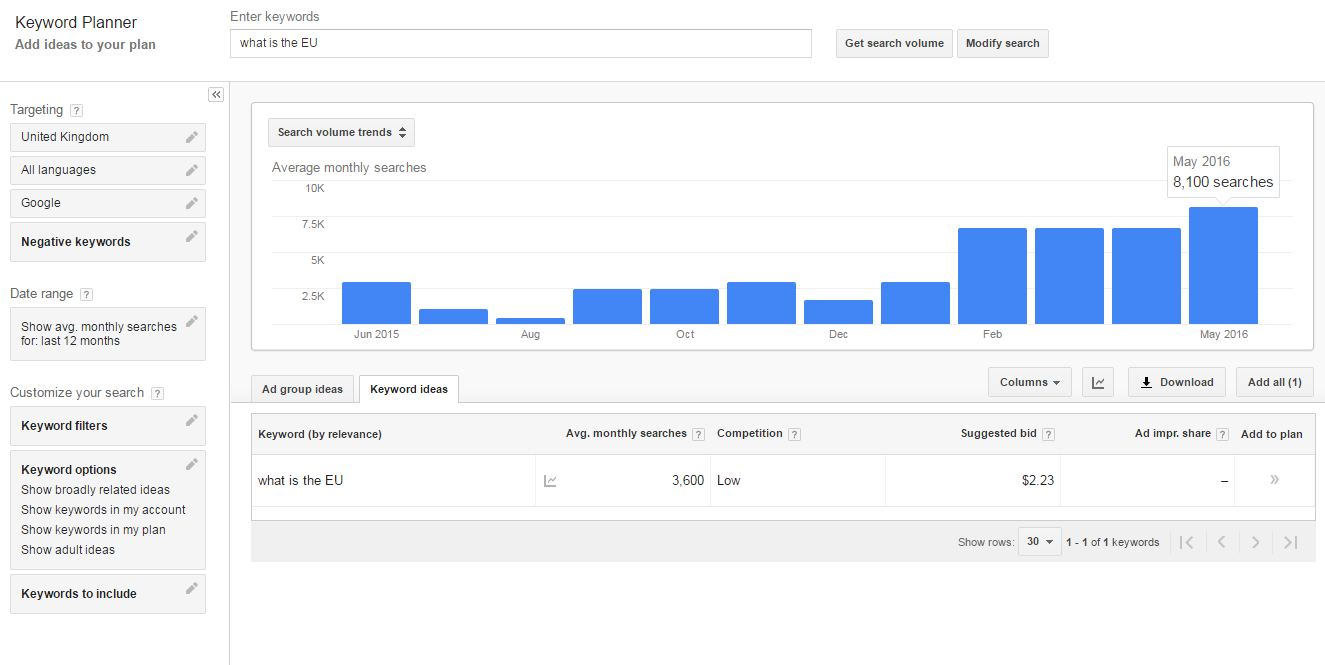A media narrative alleging residents of the United Kingdom “frantically” researched the European Union hours after they voted to withdraw from it hinges on inconclusive Google data.
“What is the EU?” is the second top UK question on the EU since the #EURefResults were officially announced pic.twitter.com/1q4VAX3qcm
— GoogleTrends (@GoogleTrends) June 24, 2016
+250% spike in “what happens if we leave the EU” in the past hourhttps://t.co/9b1d6Bsx6D
— GoogleTrends (@GoogleTrends) June 24, 2016
Stories suggesting seemingly uninformed U.K. residents researched the EU moments after last week’s so-called “Brexit” vote, which saw England and Wales siding with “leave,” while Scotland and Northern Ireland dissented with “remain,” were pushed by several newsrooms.
“Brexit: British people probably should have Googled this stuff before voting,” reported Vox.com.
NPR published a story titled, “After Brexit Vote, Britain Asks Google: ‘What Is The EU?'”
“The British are frantically Googling what the E.U. is, hours after voting to leave it,” the Washington Post reported.
Ars Technica said in a headline, “Many UK voters didn’t understand Brexit, Google searches suggest.”
And so on.
The common thread tying these stories together is that each suggests U.K. voters didn’t quite understand what they were getting into when they voted last week to withdraw from the European Union.
Stories pushing this narrative also depend on Google Trends data.
However, the statistics cited as proof of U.K. residents’ ignorance is far from conclusive, according to author Steve Patterson. For starters, he explained, the aforementioned Post article reported searches for “What is the EU?” within Britain had “more than tripled” moments after the polls closed.
“Did nobody ask: tripled from what number? Well, when you look at the data Google provides, it looks like less than 1000 Brits made that Google search,” Patterson wrote.
The problem, he continued, is that Google Trends does not suggest what many reporters appear to believe it does. .
“The journalists at WaPo were using Google Trends to see the relative trends of Google searches — but that doesn’t show the actual numbers. Google AdWords, however, does show the numbers,” he explained.
And for the month of May, “What is the EU?” was searched approximately 8,100 in the U.K., meaning it was searched about 270 times per day, according to AdWords, which offers much clearer data on search numbers.

“Well, if that number more than tripled, that means ~945 searches total. If you assume that the 270/day trend would have continued, that’s a whopping 675 additional searches in the entire UK,” Patterson concluded. “Virtually nothing. Not to mention, there’s no way to tell who made the searches — it could have been 4th graders in school learning about the EU for the first time. It could have been rural farmers who didn’t vote and just wanted to know how it would affect them. Heck, it could have been tourists in London who wanted to know more about the EU.”
And as for Google Trends’ numbers on searches for “What happens if we leave the EU?”, conclusions like the one reached by the Post don’t quite stand up to scrutiny.
“That’s right — the May average is a whopping 1300 searches total — that’s 43 per day. Now surely, that number will haven risen in June. Still, let’s say it goes up tenfold. You’re looking at 430 searches. Can WaPo take down their article now?” Patterson asked.
that peak is 1,000 people searching for ‘what is the EU’ thank goodness we got 4 billion stories about it pic.twitter.com/ykDElbOxne
— dan nolan (@dannolan) June 28, 2016
He wasn’t the only one to challenge media’s narrative about Google searches in the U.K.
The Telegraph, sports analyst and developer Danny Page and the Post’s own Christopher Ingraham have challenged the narrative that Google Trends accurately showed U.K. residents “frantically” searched for information on the E.U. following the vote.
The Google search story has coincided with a similarly themed media narrative, which states U.K. residents are experiencing immediate regret over voting to withdraw from the EU.
Vox.com piped up again with a narrative story titled, “Regret-xit: why some Brexit supporters wish they could take back their vote.”
“‘I hope I don’t live to regret this’: Brexit doubts linger at the centre of England,” the Guardian reported.
The Huffington Post meanwhile went with a story headlined, “Brexit ‘Regretters’ Say They ‘Weren’t Really Voting To Get Out Of The EU.'”
These and similar reports suggesting there is widespread regret over the result of the “Brexit” vote are based entirely on anecdotes and one-on-one interviews. The referendum passed with 17.4 million votes in favor of withdrawing from the E.U.
